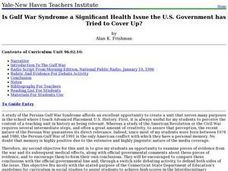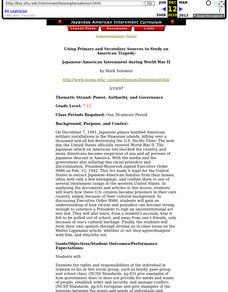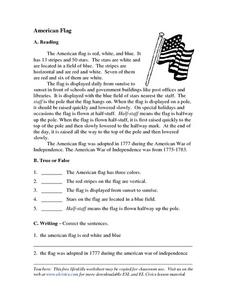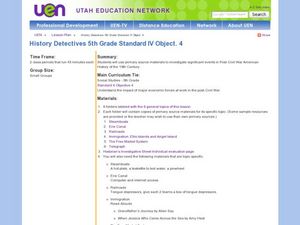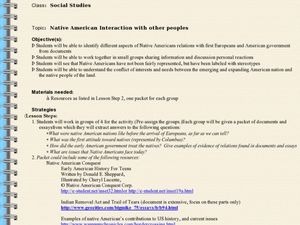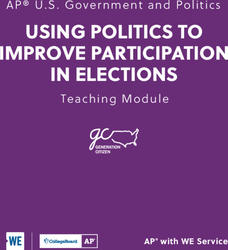Curated OER
Is Gulf War Syndrome a Significant Health Issue the U.S. Government has Tried to Cover Up?
Students examine the issues surrounding Gulf War Syndrome. In groups, they analyze evidence from the war and medical information. They participate in a debate in which they support their feelings on whether the government of the United...
Curated OER
The Pan-American Exposition of 1901
Students examine the impact of the 1901 World's Fair. In this instructional activity on invention and politics, students watch a video then conduct Internet research in order to learn about the Pan American Exposition. Students will...
Curated OER
Utah's American Indian Tribes Today
Students discover the diverse nature of Utah's peoples and cultures. They determine that Utah's American Indian tribes add to the diversity of cultures in Utah todaythat
Curated OER
Japanese-American Internment during World War II
Learners write an in-class essay on whether they agree/disagree with Lippmann's article concerning Japanese-American internment
Curated OER
American Flag
In this American flag worksheet, learners read and interpret a passage on the history of the American flag. Students answer five statements associated with the passage as true or false and rewrite two sentences correcting all the grammar...
Curated OER
Examples of Sharing as Told Through a Native American Legend
Students explore community problem solving. In this cross-curriculum literature and social studies lesson, students listen to The Legend of the Bluebonnet by Tomie DePaola and discuss how a Native American community problem was solved. ...
Curated OER
Post-Civil War American History
Fifth graders examine significant events in Post-Civil War America. In this Post-Civil War lesson, 5th graders investigate the important events after the war in 19th century America. They read primary source documents about six topics...
Curated OER
Native American Interaction with Other Peoples
Students examine the relationships between Native Americans and the Europeans who settled America. In this cultural diversity lesson, students analyze primary documents and respond to essay questions regarding the relationships.
Curated OER
European Union Governance
Become familiar with the structure and functions of the European Union. As they conduct internet research, young historians use an attached worksheet to categorize the five main institutions of the EU. A flowchart worksheet also gives...
Curated OER
How was the Constitution Used to Organize the New Government?
How did the United States Congress determine how the new president and vice president would be named when the nation was first established? Who would provide money for the government, and how would the executive branch be organized?
Center for History Education
Daily Lives of Slaves - What Really Happened?
The stories of enslaved people are preserved forever thanks to the Great Depression. Budding historians explore slave narratives gathered by a federal government initiative to discover what life was actually like for enslaved people....
Core Knowledge Foundation
Thanksgiving with the Pilgrims
Teach kindergartners about the First Thanksgiving with a series of lessons about the Pilgrims' journey to the New World. As they practice handwriting, CVC words, reading comprehension, and fun Thanksgiving songs, they learn about what...
Judicial Learning Center
The Ratification Debate
Most Americans profess their love for the US Constitution, but this was not always the case. An informative lesson overviews the debate between the Federalists and Anti-Federalists by summarizing the main arguments of each side. It...
City University of New York
Urban Politics: Machines and Reformers
Take a trip to the turn of the twentieth century with a resource about industrialism in America. With primary source documents and focus questions, learners think about the ways that government groups and organizations paved the way...
Anti-Defamation League
Columbus Day or Indigenous Peoples Day?
"Columbus Day"? Indigenous Peoples' Day"? "Native Americans' Day"? The controversy over what to call the federal holiday celebrated on the second Monday in October is the focus of a lesson that asks high schoolers to consider various...
Library of Congress
Stars, Stripes and Symbols of America: Comparing Our Flag, Past and Present
Your young historians will compare and contrast the details of the American flag today with an an image of the nation's flag from the post-Civil War era, and identify the flag's importance as a national symbol through analysis...
City University of New York
Electoral College
A presidential election is a lot like the 2004 World Series, and it's also a lot like choosing an orange in a paper bag. Apply the process of the electoral college to these two analogies with a set of lessons about government...
Annenberg Foundation
Egalitarian America
What does a true American represent? Scholars investigate the equal rights era of the 1960s and 1970s in the 20th installment of a 22-part series on American history. Using photographic, magazine, written, and video evidence, groups...
Judicial Learning Center
Civil Rights and Equal Protection
Almost every American is familiar with the Supreme Court case of Brown vs. Board of Education. Far fewer understand the constitutional reasoning or the wide-ranging consequences of the ruling in the field of criminology. The interesting...
K12 Reader
An Independent Nation
If your kids are curious about the American Revolution, help them understand more about its background with a reading passage and comprehension questions. Kids use context clues to answer each question, some of which require more...
New York City Department of Education
Geography and Early Peoples of the Western Hemisphere
Young historians discover the early people of the western hemisphere. The unit explores how the land changed, how it was used and homes of early Americans such as Incas, Mayans, Inuits, Aztecs, and Pueblos. Individuals also examine these...
C-SPAN
14th Amendment Equal Protection Clause
Two Supreme Court cases, Plessy v. Ferguson and Brown v. Board of Education take center stage in a lesson about the Equal Protection Clause of the 14th Amendment. Class members research both cases to compare and contrast the rulings.
College Board
Using Politics to Improve Participation in Elections
Instructors new to teaching AP U.S. Government and Politics classes, as well as seasoned veterans, will find this teaching guide an invaluable resource. Using a project-based approach to civics education, the lessons emphasize real-world...
Judicial Learning Center
The Judge and the Jury: Trial by Jury
Why is it so important to have a trial by jury in the American judicial system? This right is one of the hallmarks of American democracy, but it also comes with the responsibility of serving on a jury if called. Young legal scholars...


